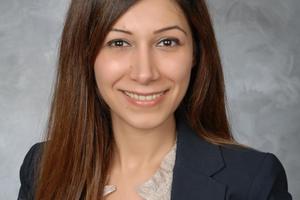
Name: Khawla Wakkaf
Home Country: Syria
Programs: Doctor of Juridical Science (J.S.D.), Graduate Minor in Peace Studies
Research Interests: Reparations & Transitional Justice, International Human Rights Law, Refugee and Forced Migration Studies
Khawla was interviewed by peace studies student Matthew Macke (B.A. ‘21).
You seem to have had a pretty active career as an attorney, aid provider, and scholar prior to enrolling at Notre Dame. Why did you decide to come to Notre Dame and why did you choose to pursue a graduate minor in peace studies?
One of the main reasons I applied for the J.S.D. program at Notre Dame was because I wanted to pursue my own research interests and explore some of the deficits and pathologies in the current international legal system and find ways to redress them.
Notre Dame offers one of the richest and most rigorous programs in the areas of international law and peace studies. The J.S.D. program at the Law School offers me great resources to pursue my own research while allowing me to study other disciplines. J.S.D. students are integrated into the academic life of the Law School and can interact with faculty members and Ph.D. students from other disciplines, commenting on each other’s work from the earliest stages of the research process.
I decided to pursue a minor in peace studies because I want to develop a holistic understanding of the root causes and subtexts of some of the challenges our world faces today. Being part of the multidisciplinary research environment at the Kroc Institute made me re-think some of my own academic conventions and helped me strengthen my legal arguments.
Forced migration and displacement come up as topics of interest for a lot of graduate students from all over the world. Where did your own interest in displacement come from?
To start off, we are witnessing an unprecedented global forced migration crisis. To a certain extent, this is ascribed to underlying factors in these movements that were not anticipated by the drafters of the 1951 Refugee Convention and its 1967 Protocol. These factors include climate change, economic crises, and human trafficking. Graduate students are trying to understand the complex nature of these trends and their causes.
The growing interest among graduate students may also be due to the fact that refugee and forced migration studies is, at its core, an interdisciplinary topic that attracts attention from students in various disciplines, and this is where we can point out the beauty of peace studies as a cross-disciplinary field that draws on a range of perspectives to identify possible solutions.
Additionally, we all have been witnessing the ongoing mistreatment of refugees and the consistent violations of human rights principles accorded to refugees and migrants under international law. As peace activists, we must address these violations and study the underlying conditions that motivate people to leave their homes in the first place.
My own interest in forced migration and displacement has been influenced by my personal background and my ongoing commitment to defending and protecting human rights for all people. Coming from a country that has produced one of the largest numbers of refugees in our modern times motivates me to work even harder to address the root causes of this phenomenon.
How has peace studies influenced your legal studies and vice versa? Are there any notable differences in how each discipline looks at conflict?
It is important to note that there is an inextricable interrelation between law and peace studies. While there are some considerable differences between the two fields, legal studies complements the field of peace studies and serves a similar purpose. In fact, one of the primary goals of the law is to prevent and resolve disputes between countries and members of society peacefully.
Law plays a critical role in conflict prevention and the peaceful settlement of disputes by assigning rights and obligations. When prevention fails, the law provides rules and procedures to resolve disputes between parties without resorting to violence and hold those who violate its rules accountable.
Peace studies offers a holistic approach to the study of conflict and violence more broadly. It is a multidisciplinary effort to understand the complex, violent behaviors that drive conflicts. Conflicts and systematic human rights violations are not produced in a vacuum, and we must understand their underlying causes in order to prevent them. We must remember that our job as peace scholars and activists goes beyond just resolving disputes and preventing conflicts to understanding the root causes of conflict and the necessary conditions for peace and human flourishing in our modern times.
As a peace studies scholar , this experience of diving into peace studies is rewarding because it challenges me to see from a different perspective and helps me find answers to some of the unanswered questions in my field.
Having lived and worked in the United States for several years now, what do you miss most about Syria?
Besides my family, of course, I miss the delicious Syrian cuisine, the smell of jasmine flowers in the old town of Damascus, and sunset walks on the Mediterranean Sea.